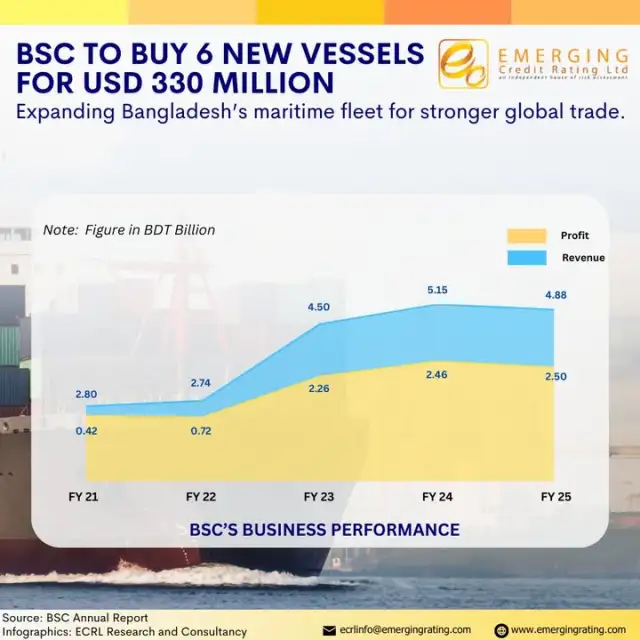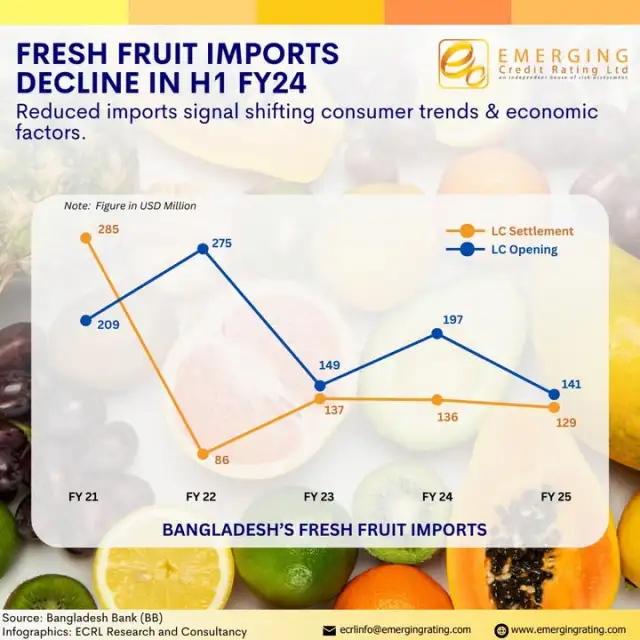আপনার SME ব্যবসা কি Credit Rating এ ভালো Grade পেতে চায়? 📊
জানুন কীভাবে SMEরা নিজেদের আর্থিক অবস্থান উন্নত করে Credit Rating বাড়াতে পারে এবং কীভাবে এটি ব্যবসার প্রবৃদ্ধিতে সহায়ক হয়।
#SME #CreditRating #BusinessDevelopment #Finance #Bangladesh
ছোট ও মাঝারি ব্যবসায়ের (SME) জন্য ক্রেডিট রেটিংয়ের গুরুত্ব নিয়ে আলোচনা! 💡
Credit Rating কীভাবে SME জন্য সুবিধা নিয়ে আসে, অর্থায়নে সহায়তা করে, এবং ব্যবসার বৃদ্ধিতে ভূমিকা রাখে তা জানুন। 📈
#Creditrating #SME #BusienssUpgrade #Finance #Bangladesh
আপনি কি জানেন মুডি'স সম্প্রতি বাংলাদেশের রেটিং B2-তে নামিয়ে 'নেগেটিভ আউটলুক' ঘোষণা করেছে? কিন্তু এর কারণ কী এবং এর প্রভাব কী হতে পারে? আমাদের আজকের ভিডিওতে আমরা আলোচনা করেছি:
🔹 মুডি'স এর রেটিং ডাউনগ্রেডের অর্থ কী?
🔹 ডাউনগ্রেডের কারণগুলো কী?
🔹 বর্তমান পরিস্থিতি ও সরকারের নেওয়া পদক্ষেপ কী কী?
🔹 ভবিষ্যৎ চ্যালেঞ্জ ও করণীয়।
YouTube Link: https://www.youtube.com/@ecrlinsights
📈 এই ভিডিওটি আপনাকে দেশের অর্থনৈতিক অবস্থা সম্পর্কে বিস্তারিত জানতে এবং সচেতন থাকতে সহায়তা করবে।
#CreditRating #Moodys #BangladeshEconomy #BusinessInsights #SovereignRating #EconomicUpdate #FinancialStability #BusinessTips
বাংলাদেশের Credit Rating Agency বনাম Moody's এবং S&P: পার্থক্য কোথায়? N.K.A. Mobin | Expert-Insights
বাংলাদেশের Credit Rating Agency গুলো এবং আন্তর্জাতিক Credit Rating Agency যেমন Moody's এবং S&P এর মধ্যে মূল পার্থক্য কী? আমাদের দেশীয় সংস্থা কি Sovereign Rating করে? আর বিদেশি কোম্পানিগুলোকে কি আমরা রেট করতে পারি?
এই ভিডিওতে, ECRL-এর Executive President এবং ACRAB-এর President, জনাব N.K.A. Mobin, FCS, FCA এই গুরুত্বপূর্ণ প্রশ্নগুলোর উত্তর দিয়েছেন।
ভিডিওটি দেখুন এবং দেশের Credit Rating Industry সম্পর্কে বিস্তারিত জানুন।
#CreditRating #ECRL #NKA_Mobin #Moodys #S&P #BangladeshFinance #SovereignRating #BusinessInsights
Credit Rating Industry-তে Competition কি প্রয়োজনীয় অথবা ক্ষতিকর? | N.K.A. Mobin | Expert-Insights
Credit Rating Industry-তে Competition কি সত্যিই প্রয়োজনীয়? এটি কি Industry-এর মানোন্নয়ন এবং Transparency বাড়াতে সাহায্য করে?
এই ভিডিওতে, ECRL-এর Executive President এবং ACRAB-এর President, জনাব N.K.A. Mobin, FCS, FCA Credit Rating Industry-তে প্রতিযোগিতার গুরুত্ব এবং এর প্রভাব নিয়ে আলোচনা করেছেন।
ভিডিওটি দেখুন এবং Credit Rating Industry-এর ভবিষ্যৎ এবং উন্নয়নের দিকগুলো সম্পর্কে জানতে থাকুন।
#CreditRating #ECRL #NKA_Mobin #CreditRatingIndustry #FinanceBangladesh #BusinessInsights
Credit Rating Downgrade মানেই কি Default? Rating Improvement Tips | N.K.A. Mobin | Expert-Insights
কোনো entity-এর Credit Rating downgrade মানেই কি default এর আশঙ্কা? আর যারা তাদের Credit Rating উন্নত করতে চান, তাদের জন্য কি গুরুত্বপূর্ণ পরামর্শ আছে?
এই ভিডিওতে, ECRL-এর Executive President এবং ACRAB-এর President, জনাব N.K.A. Mobin, FCS, FCA Credit Rating downgrade-এর মানে এবং এটি প্রতিরোধ বা উন্নত করার উপায় নিয়ে আলোচনা করেছেন।
ভিডিওটি দেখুন এবং Credit Rating সম্পর্কিত গুরুত্বপূর্ণ দিকগুলো সম্পর্কে জানুন।
#CreditRating #ECRL #NKA_Mobin #CreditRatingTips #FinanceBangladesh #BusinessInsights
Credit Rating কি একবারই করা হয়? Is rating a one-time exercise? | N.K.A. Mobin | Expert-Insights
Credit Rating কি শুধুমাত্র একবারই করা হয় নাকি এটি একটি চলমান প্রক্রিয়া? এই ভিডিওতে, ECRL-এর Executive President এবং ACRAB-এর President, জনাব N.K.A. Mobin, FCS, FCA এই গুরুত্বপূর্ণ প্রশ্নের উত্তর দিয়েছেন এবং Credit Rating প্রক্রিয়ার ধারাবাহিকতা নিয়ে আলোচনা করেছেন।
ভিডিওটি দেখুন এবং Credit Rating এর দীর্ঘমেয়াদী প্রভাব এবং এর পুনর্মূল্যায়ন সম্পর্কে জানুন।
#CreditRating #NKA_Mobin #ECRL #BangladeshFinance #CreditRatingProcess #FinancialInsights
Credit Rating কি একবারই করা হয়? Is rating a one-time exercise? | N.K.A. Mobin | Expert-Insights
Credit Rating কি শুধুমাত্র একবারই করা হয় নাকি এটি একটি চলমান প্রক্রিয়া? এই ভিডিওতে, ECRL-এর Executive President এবং ACRAB-এর President, জনাব N.K.A. Mobin, FCS, FCA এই গুরুত্বপূর্ণ প্রশ্নের উত্তর দিয়েছেন এবং Credit Rating প্রক্রিয়ার ধারাবাহিকতা নিয়ে আলোচনা করেছেন।
ভিডিওটি দেখুন এবং Credit Rating এর দীর্ঘমেয়াদী প্রভাব এবং এর পুনর্মূল্যায়ন সম্পর্কে জানুন।
#CreditRating #NKA_Mobin #ECRL #BangladeshFinance #CreditRatingProcess #FinancialInsights
Credit Rating কিভাবে Banks এবং Financial Institutions কে সাহায্য করে? | N.K.A. Mobin | Expert-Insights
Banks এবং Financial Institutions কি ভাবে Credit Rating ব্যবহার করে? এই অংশে ECRL-এর Executive President এবং ACRAB-এর President, জনাব N.K.A. Mobin, FCS, FCA আলোচনা করেছেন:
✔️ Credit Rating এর মাধ্যমে Banks এবং Financial Institutions কীভাবে ব্যবসার ঝুঁকি বিশ্লেষণ করে।
✔️ Businesses-এ Credit Facilities প্রদানের ক্ষেত্রে কতটা সতর্কতা অবলম্বন করা হয়।
ভিডিওটি দেখুন এবং জানুন Credit Rating এর গুরুত্বপূর্ণ ভূমিকা সম্পর্কে।
#CreditRating #ECRL #NKA_Mobin #FinancialInstitutions #Banks #BangladeshFinance #BusinessInsights
Credit Rating Agencies কিভাবে নিজেদের independence বজায় রাখে, যদিও entities/businesses তাদের রেটিং-এর জন্য পেমেন্ট করে? এই গুরুত্বপূর্ণ প্রশ্নের উত্তর দিয়েছেন ECRL-এর Executive President এবং ACRAB-এর বর্তমান President, জনাব N.K.A. Mobin, FCS, FCA।
এই অংশে থাকছে:
✔️ Credit Rating Agency-এর independence নিশ্চিত করার পদ্ধতি।
✔️ Industry best practices নিয়ে আলোচনা।
ভিডিওটি দেখুন এবং Credit Rating Industry সম্পর্কে গুরুত্বপূর্ণ অন্তর্দৃষ্টি অর্জন করুন।
Credit Rating Agencies কি সত্যিই Independent? | N.K.A. Mobin | ECRL Expert-Insights Part-3
Credit Rating Agencies কিভাবে নিজেদের independence বজায় রাখে, যদিও entities/businesses তাদের রেটিং-এর জন্য পেমেন্ট করে? এই গুরুত্বপূর্ণ প্রশ্নের উত্তর দিয়েছেন ECRL-এর Executive President এবং ACRAB-এর বর্তমান President, জনাব N.K.A. Mobin, FCS, FCA।
এই অংশে থাকছে:
✔️ Credit Rating Agency-এর independence নিশ্চিত করার পদ্ধতি।
✔️ Industry best practices নিয়ে আলোচনা।
ভিডিওটি দেখুন এবং Credit Rating Industry সম্পর্কে গুরুত্বপূর্ণ অন্তর্দৃষ্টি অর্জন করুন।
Credit Rating কীভাবে কোনো entity-এর creditworthiness মূল্যায়ন করে? Credit Rating এর Evaluation Criteria এবং এর প্রভাব নিয়ে এই ভিডিওতে কথা বলেছেন ECRL-এর Executive President এবং ACRAB-এর বর্তমান President, জনাব N.K.A. Mobin, FCS, FCA।
এই অংশে থাকছে:
✔️ Credit Rating এর Evaluation Criteria।
✔️ Credit Information Bureau এবং Credit Rating Agency-এর মধ্যে পার্থক্য।
✔️ Credit Rating দেওয়ার সময় গুরুত্বপূর্ণ Common Factors।
✔️ Difference between Credit Rating and CIB
#CreditRating #ECRL #BangladeshFinance #Creditworthiness #EvaluationCriteria #CreditInformationBureau #BanglaFinance

 External Credit Assessment Institution (ECAI) It is not an all-encompassing label of “goodness” for a corporation.
External Credit Assessment Institution (ECAI) It is not an all-encompassing label of “goodness” for a corporation.






































